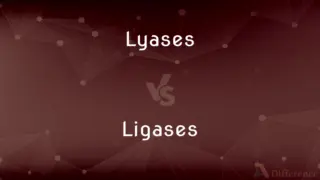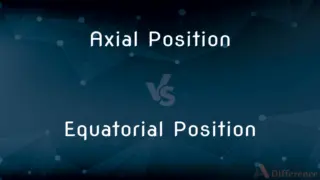Accordantly vs. Accordingly — What's the Difference?
Edited by Tayyaba Rehman — By Fiza Rafique — Updated on February 24, 2024
"Accordantly" means in a manner that is in agreement or harmony with something, emphasizing congruence or compatibility. "Accordingly" refers to acting in a way that is appropriate or consistent with the circumstances or previously stated information.

Difference Between Accordantly and Accordingly
Table of Contents
ADVERTISEMENT
Key Differences
Accordantly is an adverb that describes actions or outcomes that are in alignment or harmony with certain principles, expectations, or conditions. It emphasizes a sense of agreement or compatibility between elements or ideas, suggesting that things are working together smoothly and without conflict. For example, if two systems operate accordantly, they function in a coordinated and harmonious manner.
Accordingly, on the other hand, is used to indicate that something is done in response to a situation or set of conditions, often as a logical consequence of what has been previously stated or observed. It suggests a cause-and-effect relationship where actions are taken based on specific circumstances or information. For instance, if a decision is made based on certain data, the subsequent actions taken "accordingly" are meant to align with that decision.
"Accordantly" focuses on the concept of agreement and harmony, while "accordingly" centers on the idea of suitability or appropriateness to the circumstances. In usage, "accordingly" is far more common and is frequently used to conclude arguments or statements, guiding the listener or reader on how to interpret or act on the information provided. "Accordantly," being less common, is typically used in more specialized or formal contexts to emphasize a harmonious or congruent relationship.
Both adverbs serve to connect outcomes or behaviors with preceding conditions or principles, but they differ in their emphasis: "accordantly" highlights harmony and agreement, while "accordingly" stresses an appropriate response or adaptation to the given circumstances or information.
Comparison Chart
Definition
In a manner that is in agreement or harmony.
In a way that is appropriate to the circumstances or based on what was previously stated.
ADVERTISEMENT
Focus
Emphasis on congruence and compatibility.
Emphasis on suitability or appropriateness to the situation.
Usage Context
Less common, used to describe harmonious or coordinated relationships or functions.
More common, used to indicate actions taken as a response or adaptation to given information or circumstances.
Example Usage
"The two departments worked accordantly to streamline the process."
"The evidence was inconclusive; accordingly, no charges were filed."
Implication
Suggests a smooth and conflict-free alignment between elements.
Suggests a logical consequence or adaptation based on preceding facts or decisions.
Compare with Definitions
Accordantly
In agreement or harmony with something.
The team members acted accordantly with the project's goals.
Accordingly
In a manner that is appropriate to the circumstances.
The data was flawed; accordingly, the research was revisited.
Accordantly
Reflecting compatibility or congruence.
The new policies were implemented accordantly with the company's values.
Accordingly
As a logical consequence of something stated.
He was the highest bidder and, accordingly, won the auction.
Accordantly
Denoting coordinated action or function.
The software systems operated accordantly, enhancing efficiency.
Accordingly
Reflecting adaptation or response to a situation.
The weather turned cold, and she dressed accordingly.
Accordantly
Suggesting a seamless integration.
The two approaches were blended accordantly to achieve the desired outcome.
Accordingly
Guiding action based on prior information.
The instructions were clear, and he acted accordingly.
Accordantly
Emphasizing a unified or consistent manner.
Their views on the matter were expressed accordantly, showing a unified stance.
Accordingly
Indicating compliance with rules or decisions.
The regulations changed, so the procedures were adjusted accordingly.
Accordantly
In accordance or agreement; agreeably; conformably.
Accordingly
(manner) Agreeably; correspondingly; suitably
He was absent when I called, and I accordingly left my card.
Accordantly
Being in agreement or harmony; consonant.
Accordingly
In accordance; correspondingly.
Accordantly
In accordance or agreement; agreeably; conformably; - followed by with or to.
Accordingly
So; consequently.
Accordingly
Agreeably; correspondingly; suitably; in a manner conformable.
Behold, and so proceed accordingly.
Accordingly
In accordance with;
She acted accordingly
Common Curiosities
Can "accordingly" and "accordantly" be used interchangeably?
Due to their different emphases—harmony versus appropriateness—they are not typically interchangeable and should be used according to their specific meanings.
In what contexts might "accordantly" be preferred?
"Accordantly" might be preferred in contexts that emphasize harmony, coordination, or agreement among elements, such as in musical compositions, collaborative work, or system integrations.
How does "accordingly" function in an argument or explanation?
"Accordingly" is often used to introduce a conclusion or action that logically follows from the information or argument presented earlier.
Is "accordantly" used in legal or technical documents?
While not exclusive to these genres, "accordantly" can be found in legal or technical documents where the emphasis is on agreement or compliance with certain standards or principles.
Is "accordantly" commonly used in everyday language?
"Accordantly" is less common and more often found in formal or literary contexts, whereas "accordingly" is widely used in both formal and informal situations.
How does the use of "accordingly" affect the tone of a statement?
Using "accordingly" can lend a logical, reasoned tone to a statement, indicating that the subsequent information or action is a rational response to what has been previously stated.
Can "accordingly" be used to start a sentence?
Yes, "accordingly" can start a sentence, especially when summarizing a response or conclusion drawn from the preceding content.
How does understanding the difference between "accordantly" and "accordingly" improve communication?
Knowing the distinction enhances clarity and precision in communication, allowing for more accurate expression of whether harmony or an appropriate response is being described.
How do "accordingly" and "accordantly" relate to cause and effect?
"Accordingly" is more directly related to cause and effect, indicating an action taken as a direct consequence of a cause. "Accordantly" relates more to the harmony or agreement between elements, which might not imply a direct cause-and-effect relationship.
Are there any synonyms that can replace "accordantly" or "accordingly" without changing the meaning?
For "accordantly," synonyms like "harmoniously" or "congruently" might work, while for "accordingly," words like "consequently" or "therefore" could be suitable, depending on the context.
Share Your Discovery

Previous Comparison
Homology vs. Homoplasy
Next Comparison
Given vs. GivingAuthor Spotlight
Written by
Fiza RafiqueFiza Rafique is a skilled content writer at AskDifference.com, where she meticulously refines and enhances written pieces. Drawing from her vast editorial expertise, Fiza ensures clarity, accuracy, and precision in every article. Passionate about language, she continually seeks to elevate the quality of content for readers worldwide.
Edited by
Tayyaba RehmanTayyaba Rehman is a distinguished writer, currently serving as a primary contributor to askdifference.com. As a researcher in semantics and etymology, Tayyaba's passion for the complexity of languages and their distinctions has found a perfect home on the platform. Tayyaba delves into the intricacies of language, distinguishing between commonly confused words and phrases, thereby providing clarity for readers worldwide.















































